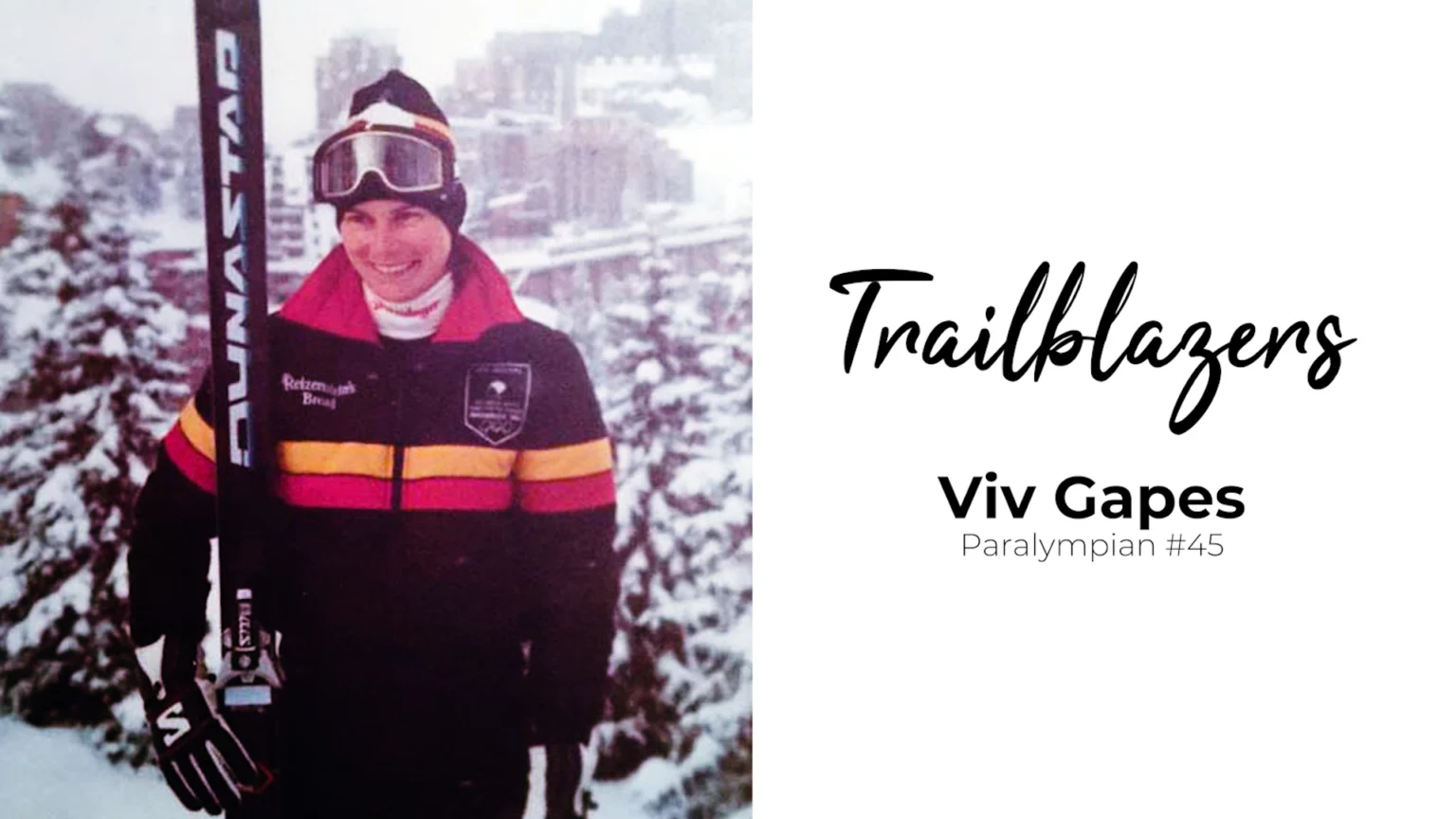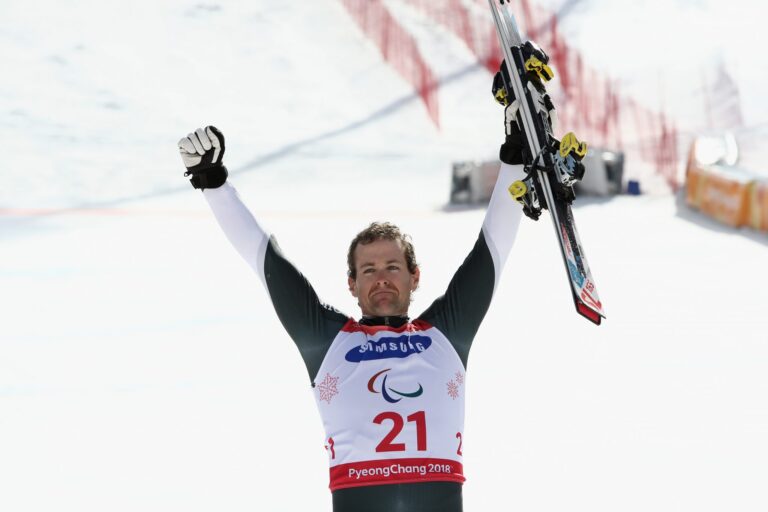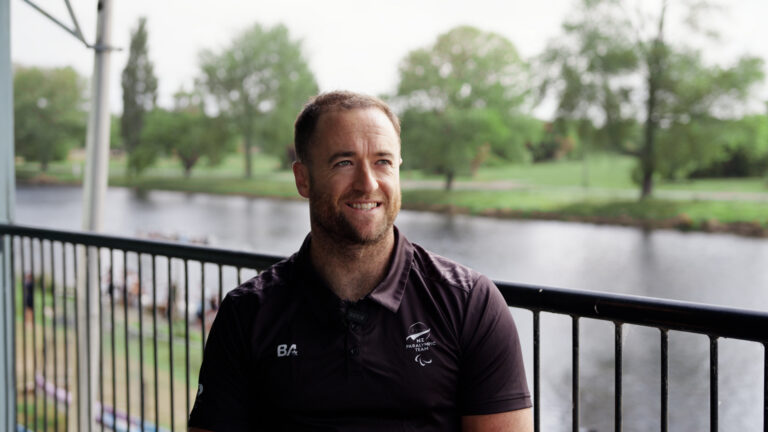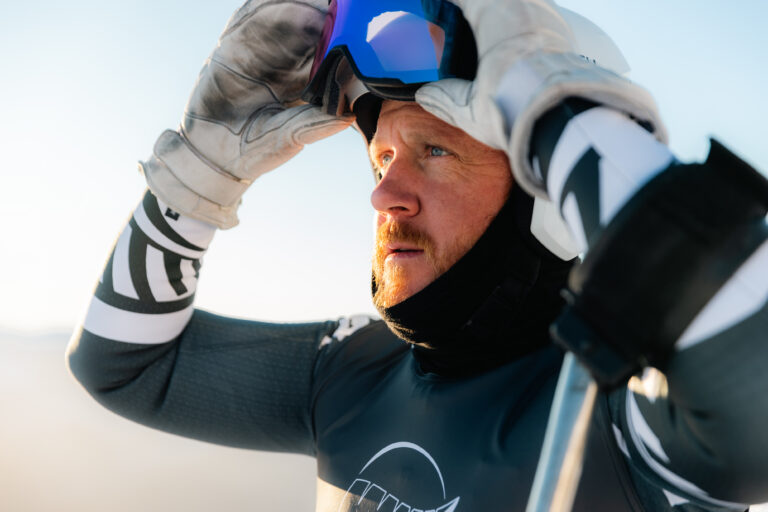For someone who modestly describes themselves as “a bit of a scaredy cat”, Paralympian #45 Viv Gapes (nee Martin) has done a lot to disprove the rather harsh self-assessment.
The vision-impaired Para alpine skier was a pioneering performer, who claimed three medals at the Innsbruck 1984 Paralympic Winter Games, becoming the first Kiwi to strike gold at a Paralympic Winter Games.
Gapes later went on to claim a trio of medals at the 1986 World Disabled Skiing Championships in Sweden, her seismic impact at the vanguard of Paralympic winter sports in New Zealand assured.
Born with ocular toxoplasmosis, an infection that caused scar tissue to cover her retinas, Viv has some peripheral vision but can’t drive or read fine print.
Raised on a sheep and cattle farm in the small rural hamlet of Waitahuna – in Otago – her parents raised Viv to be independent.
“When you grow up on a farm you have jobs to do, and the fact my mum and dad did not wrap me up in cotton wool was the saving of me,” explains Viv. “I had to contribute in some way and one of my jobs was feeding out hay from the back of a moving truck.”
Between the ages of eight and 12 she attended Homai College in Auckland as a boarder at the school for visually impaired students. Viv loved life at the school. Classes were divided into print and braille, and music and sport were encouraged. She recalls playing softball with a noisy ball during her time there, before later moving on to high school at St Hilda’s Collegiate in Dunedin. There she played social hockey and recalls: “I played as a right half, and my team-mates would yell at me when the ball was near. It was great fun.”
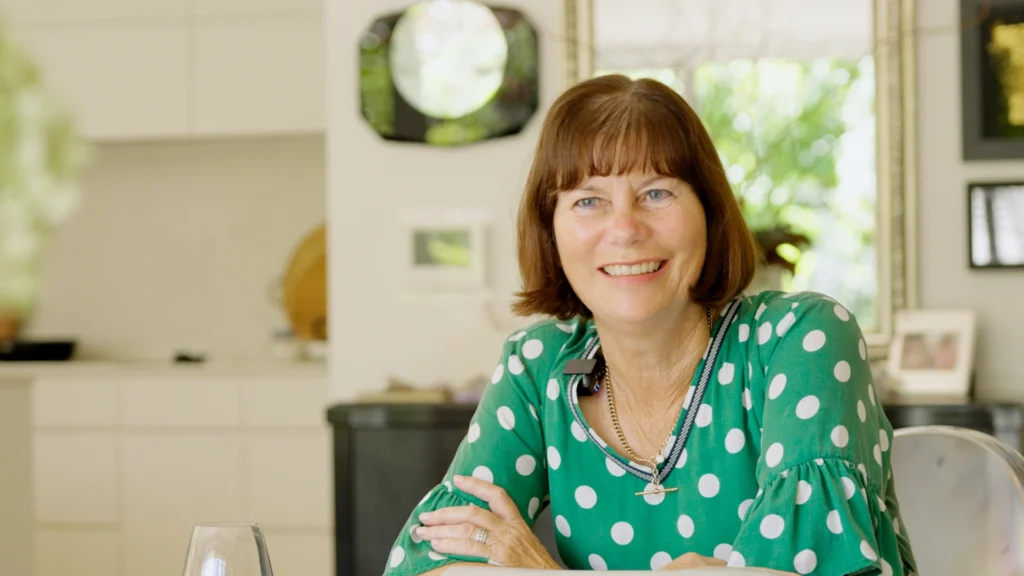
While later studying for a Bachelor of Arts at the University of Otago, she was introduced to the sport of Para alpine skiing. South Island physiotherapist and ski instructor Gillian Hall had travelled overseas and was inspired by the disability ski programmes she saw. Keen to grow Para alpine skiing in New Zealand, she reached out to disabled university students to give the sport a go, and Viv did not require a second invitation.
“I was ready to do something different,” she adds. “I didn’t want to just be Viv with a vision impairment, I wanted to be more than that.
“I remember the first time on the snow with Gilly at Coronet Peak. She took me up the slope and pointed me downhill. I was in a ski wedge with just my poles holding me, thinking ‘Oh my God, this is scary’ but that is how I learned.”
Fearful she may have initially been, but Viv was not going to back down from the challenge. Determined to navigate a route to the bottom “of this darned mountain” and given genuine belief thanks to Gillian, she gradually picked up both confidence and skill.
“Gilly was a super special lady,” explains Viv. “She was a real powerhouse who got her instructors certificate in the 70s, which was unusual for a woman back then. Going overseas and discovering disabled skiing, she saw what was possible. She had a massive great smile, was a vibrant person and she was very hard to say no to!”
The initial training squad for Innsbruck 1984 was named shortly after the 1982 New Zealand Disabled Skiing Championships, but Viv did not feature.
Determined to improve and catch the eye of selectors, she took up a part-time role working in the cafeteria at Mt Hutt to be closer to the snow. In 1983 she emerged as a much more rounded and technically proficient athlete, impressing Roger McGarry, the Team Manager of the NZ Paralympic Team at Innsbruck 1984.
“Vision impaired skiers don’t have the cues that fully sighted skiers have, and they are very reliant on their guide,” says Roger. “But Viv always had a great ability to anticipate changes in terrain, and her technique was as good as a sighted skier.”
Viv made huge gains and was rewarded with selection for Innsbruck 1984.
Elated to secure her place on the Team, she was however keen to acknowledge the massive role her guide, Mike Curzon, made in her success.
The guide’s role was to ski ahead of Viv, tapping his poles to indicate their location on the slopes and to shout out directions.
“It must have been so hard for Mike,” she recalls. “He was a really big guy with muscular legs and I’m much shorter. I’m trying hard to follow him. I couldn’t have done it without Mike. We got along famously and are still great friends today. The guides do not get to stand on top of the podium, but they deserve a medal because they are such a big part of it.”
Earning selection in 1983 for the NZ Paralympic Team was a huge thrill and she set about the huge fundraising challenge with gusto. Supported massively by her generous local community, financially backed by the Blind Foundation (now Blind Low Vision NZ), and with the Team receiving a generous donation of $10,000 from Vogel’s Bread, Viv was on her way to Europe for the Innsbruck 1984 Paralympic Winter Games.
Ahead of her first ever international competition, she and the Team spent three weeks training in Avoriaz in the French Alps – which proved a mind-blowing experience for the then 24-year-old Para alpine skier.
“I had never skied anywhere other than New Zealand, so to be around so much snow, with amazing facilities was very special,” she says. “It was a lot of fun with the team. We had worked so hard to get funds. It really was a special opportunity to take us out of our ordinary lives.”
No longer the “scaredy cat” of the past, Viv had developed into a confident young woman determined to give her best. So much so that Roger recalls Viv acting as a hugely motivational force to the Team in Avoriaz.
“We had a team meeting when Viv stood up to say she felt some members of the Team weren’t taking the competition seriously enough. She said, ‘Hey guys, I know the bars are nice, but we are here to win medals, let’s knuckle down and change it up’. Her response surprised me, but it showed that when she had a goal in mind, she could flick a switch.”
Viv recalls staying in a picture postcard guest house in the village of Mutters, near Innsbruck, Austria and reminisces about the excitement she felt seeing athletes from many other countries conversing in multiple different languages.
After an Opening Ceremony held in the village square, it was time for action. Viv spectacularly delivered by winning gold in the Women’s Giant Slalom B2 and silver medals in both the Downhill B2 and Alpine Combination B2 events. Claiming gold by a massive eight-and-half-seconds in her favoured giant slalom was a highlight.
Viv recalls: “Finishing second in the downhill gave me the confidence and belief that winning gold was a possibility. Paralympian #46 Chris Orr (silver in the Men’s Downhill B1) and Paralympian #44 Mark Edwards (bronze in the Men’s Downhill LW3) also won medals for New Zealand, so we had a very upbeat team and everything went well.”
Roger recalls his pride at how the eight-strong Team of New Zealand Para alpine skiers brought home five medals from Innsbruck – spearheaded by Viv.
“We were up against big nations, and we were very much the underdogs,” he says. “So, to come away with five medals was fantastic,” he says.
“Viv was a happy-go-lucky person but behind that she was a strong, driven woman. It just showed what can be achieved with a bit of belief.”
Returning home to New Zealand, Viv was greeted by proud family and waiting media at Dunedin Airport.
Viv carried on competing for two more years and matched her achievements at Innsbruck 1984 by taking giant slalom gold, downhill and the combined silver medals at the 1986 World Disabled Skiing Championships in Sweden.
Later in 1986 Viv was awarded New Zealand Skier of the Year for her ground-breaking achievements.
After completing a Journalism diploma in Wellington, Viv worked for several years for the Blind Foundation in Auckland in public relations. Married in 1989, she has three children and two grandchildren, and has remained active as a keen walker, gym goer and cook.
Today, living in central Auckland, few would be aware of Viv’s pioneering achievements. Roger believes that is unfortunate.
“Viv was very much a trailblazer for Para athletes and women in general,” he adds. “She set a bar which for others at that time might have been too high, but by winning gold she acted as the forerunner for other Paralympic winter athletes to follow.”
Some 41 years on from her triple medal-winning success in Austria, modest and humble Viv looks back at her success with an element of bewilderment. Yet she fondly cherishes her accomplishments, not just for what it gave her at the time but how it has enriched her life.
“Winning gold gave me so much self-confidence, which was just wonderful,” she says. “I learned so many things like goalsetting and self-discipline. It showed me what I was capable of, and it gave me so many life skills. My competitive skiing years were a hugely exciting time in my life, and I have always been grateful for the opportunity.”

